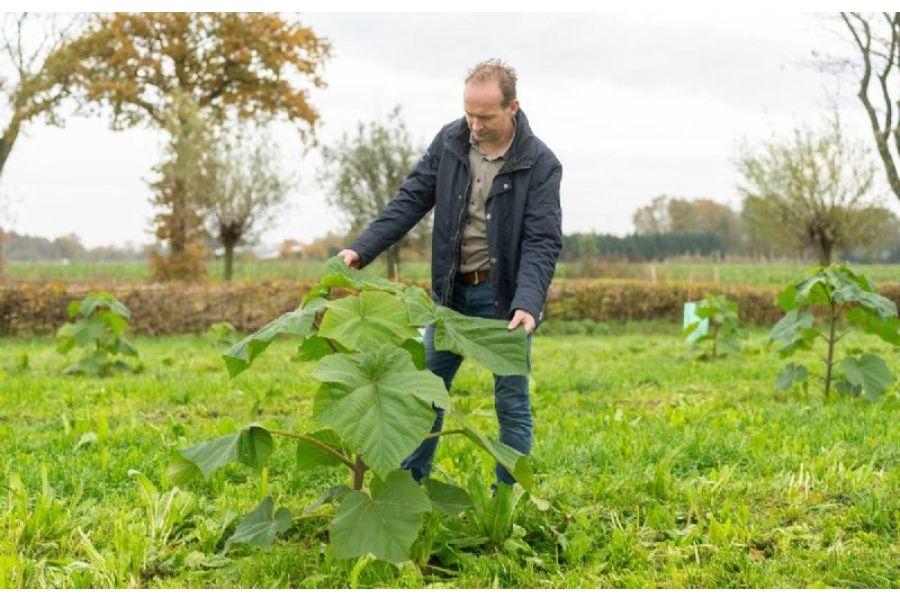Fast-growing wood plants that make an important contribution to the transition to sustainable agriculture. Farmer Smolenaers gets energy from it. "Every morning when I get up, I realize: we made the right choice."
Proudly Paul Smolenaers looks out over his field on the Hardsteeg in Nederweert, Limburg. Where corn, wheat and sugar beets used to grow, almost a thousand young kiribo trees now stand.
In the winter of 2018, Paul and Inge Smolenaers found themselves and their farm at a T-junction. "The question was: do we turn left and make another investment to keep our pig farm future-proof? Or do we turn right and choose a new adventure?"
The couple chose the latter and applied for the reorganization scheme. Certainly for Paul Smolenaers, it was not an easy decision. Animal husbandry was his life. With great dedication, the Limburg farmer spent ten years running the pig farm that his father Piet laid the foundation for in 1972. 'You don't give up your parents' life's work just like that, but looking to the future, this was the wisest choice,' recalls the entrepreneur in heart and soul.
."Society is changing, as a livestock farmer you have to deal with increasingly strict requirements. My age also played a role. I am still relatively young. If I wanted to do something else, this was the moment," Smolenaers continues.
.
A New Future
After the pigsties were demolished, the site was rearranged and blended naturally into the landscape. As of March 2023, Smolenaers could literally start building a new future. Among other things, using sustainable materials from his remediated stables, he and his father built a new shed.
Much of this space the Nederweerten native divided into wooden units that he now rents out as storage units to business owners and individuals. In another part of the shed are the machines he uses to work his land.
And then there is a smaller space where Smolenaers can grow crickets when the protein market calls for it. "After I quit my pig farm, I turned to insect farming," he says. The crickets are processed into cricket powder and are packed with protein, fiber and vitamins.
"Unfortunately, due to the corona crisis, the sales market collapsed. Since then, production of the insects has been on the back burner. I am now maintaining the cricket population so that I can scale up if necessary when demand picks up again," explains the farmer.
Wood farming as a revenue model
.The entrepreneur is always looking for new opportunities to become more sustainable. In doing so, Smolenaers looks beyond the boundaries of his own farm. As one of the first farmers in the Netherlands, he joined Dealin.Green in 2023. This is a platform in which the entire life cycle from young plant to processed natural product - biobased - is housed in one chain.
Agriculture is also becoming more stringent, Smolenaers notes. "That's why I was looking for a cultivation in which I can combine a lot of good things for people, nature and the environment. It became wood farming. Wood has the future."
Smolenaers points to a kiri tree right in front of him in the field. "In just seven years, this grows into a tree as tall as 10 meters, with a diameter of 40 centimeters. The kiri, also called Anna Paulowna, holds much more CO₂ than other trees," he explains.
Solution to nitrogen problem
.And the little tree has even more advantages, according to the Limburg entrepreneur: "It promotes biodiversity, enriches the soil, retains water and also contributes to a solution for the nitrogen problem. In fact, if all arable farmers in the Netherlands plant kiri trees on 5 percent of their fields, this problem would be solved."
The destination of his trees is already fixed. Once fully grown, the kiris will get a new life. For example, as sustainable stairs, manufactured by Upstairs Staircase Renovation. 'This wood is extremely strong, very light and highly insulating and therefore extremely suitable for construction. It feels good to contribute to this,' says Inge Smolenaers, who supports her husband Paul in his work on the land and in the shed.
Extending life
.But that doesn't complete the circle, the Limburg couple knows. "Do you know what is so special about the kiri tree? If it is cut down after seven years, it just starts growing again. So you can extend the lifespan of this tree as much as seven times," Paul Smolenaers points out.
.A beneficial side effect. "That makes timber cultivation as a business model very suitable to pass on to the next generation. In our case, perhaps to our daughters Bente and Marit. A nice thought for later," concludes the entrepreneur.
Source: New Harvest